Text
Sun Tzu basically wrote a very polite, well-worded FAQ (frequently asked questions) for people that desperately needed to hear it. He could have created some twelve volume epic, but almost no one would have read it.
He's a man who said "RTFM" then realized no one would, so made it simpler.
Sun Tzu is so fucking funny to me because for his time he was legitimately a brilliant tactician but a bunch of his insight is shit like "if you think you might lose, avoid doing that", "being outnumbered is bad generally", and "consider lying."
145K notes
·
View notes
Text
Understanding Addressing The Pain
Writing this in 2024 it seems that conspiracy theories flourish in spiritual and mystical communities we’d not expect to see them in. To flip through Instagram or podcasts and hear some “crunchy” New Age yoga teacher swing from positions to WHO conspiracies and Hillary-Clinton-Is-A-Clone is disturbing. Worse, like the more standard conspiracy theories we’re used, to there’s a violent trend in these communities.
The Starseeds are buying guns, the Yoga enthusiasts want to hang doctors, and we’re wondering what the shit is going on.
Well first, if you’re surprised metaphysical communities have issues with conspiracies, fascism, and violent imagery, you’re not paying attention. This has always happened, from grifters to cultic spinoffs to political manipulation. We’re just a bit surprised by it since too many of us still, unconsciously, think of these as some fusion of hippies and peace-and-love New Agers.
But let us not forget that many people seek out magical and metaphysical practices out of pain.
That ache that won’t go away so you try yoga. The spiritual void from consumer culture that leads you to a Buddhist church. The bad year that leads you to magic in hope for understanding and influence. So many of us take to the mystical out of ennui or agony or need.
This is not always a bad thing of course. Those moments of waking up are vital for us to get what’s going on and realize what we have to do differently. But sometimes, the pain leads you down terrible paths, to grift, to fanaticism, to worse.
Conspiracy theories for many are an attempt to soothe pain as well. To explain problems you can’t explain easily. To seek assurance of meaning, even if the meaning is horrible. To give you some way to channel that rage inside you left from your bad job or bad family. Conspiracy theories, used by grifters and manipulators, are also something that can make people feel better for awhile.
So many of us turn to “The Big Picture” in a moment of pain. But it might not be waking up, just finding new ways to numb ourselves.
As much as the conspiracism and tilts towards revenge fantasies bother me in many communities of the metaphysical, keeping this in mind helps. It helps us understand how to handle people better, protect them from falling into traps, and maybe avoid the traps ourselves.
It also reminds us that these days, some of these folks might turn violent as we’ve seen, and we can keep an eye out.
- Xenofact
0 notes
Photo

City Magic according to Tom o’ Bedlam (source: The Invisibles by Grant Morrison)
191 notes
·
View notes
Text
Don’t Know It Until I Say It
Those of us who engage in mystical, magical, and meditative activity face a paradox of recording information. It’s useful, it lets us review things, but there’s also, well, some problems.
Sure, it helps to write things down as you might read them. Also, after awhile you end up with a pile of notes and no time to read them. There’s also a little self-pressure to review such things. It takes the fun out of “holy shit, I had an insight.”
Yeah, you may write down great wisdom. But sometimes mystical insights are of the moment, and the future readings might not help. “The mind is a bird on fire” might be a good album name, but what were you talking about? Were you high? Can you remember?
Writing down deep experiences can become its own purpose - and squeeze out your other activity. When you’re trying to record your deep experiences, you might focus on the record and not the doing. When you’re ready to write it down, you might not do the meditation or spellcasting or whatever you need to do to have something to write down.
These are what I’ve experienced. I assume, perhaps arrogantly, you’ve experienced some of them. I also assume you found who other issues of writing down mystic experiences I’ve not had - or aren’t aware of. Let’s commiserate if you want to email me.
Anyway, such negatives are almost enough to make you not want to record your insights for posterity - or whatever.. But I actually have found a very good reason to do so that has nothing to do with future review or recording the wisdom of your ages. To write down or otherwise portray your mystic experiences helps you understand and process them.
You know how it goes, you have something in your head and you can’t quite understand it. But when you write it down, sketch it out, do something to put it in an understandable form you learn. The act of communicating helps you understand what you experienced.
Sometimes you write things down or whatever to talk to yourself. You might not look back on it or reread it or whatever, but at least you get it when you record it. That’s fine, but maybe the act of writing down an experience lets you process it.
I found this doing a mix of art and trying to figure how to write down my various experiences. I noticed when I wrote down things that happened in meditation as small bits of text, like the little chapterlets of The Tao Te Ching, I got them. The target audience was me at that moment, but worked better than just taking direct notes.
So when you record your various experiences in magic or meditation, remember one reason is to figure out whats’ going on right then. Don’t ignore the moment.
Even if you find the moment is the only time you pay attention to what you wrote down.
- Xenofact
0 notes
Text
The Ask Dr. Hal show is your hookup to weirdness, wisdom, and more! Please, join us this Sunday!
0 notes
Text

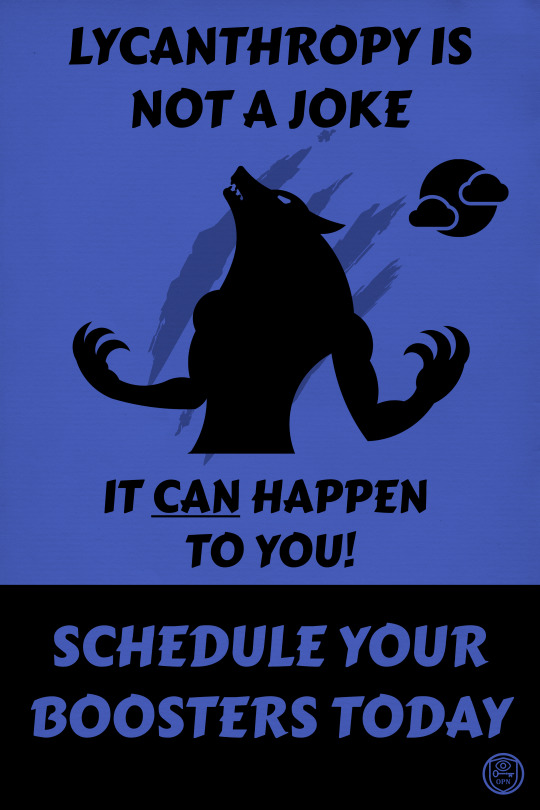
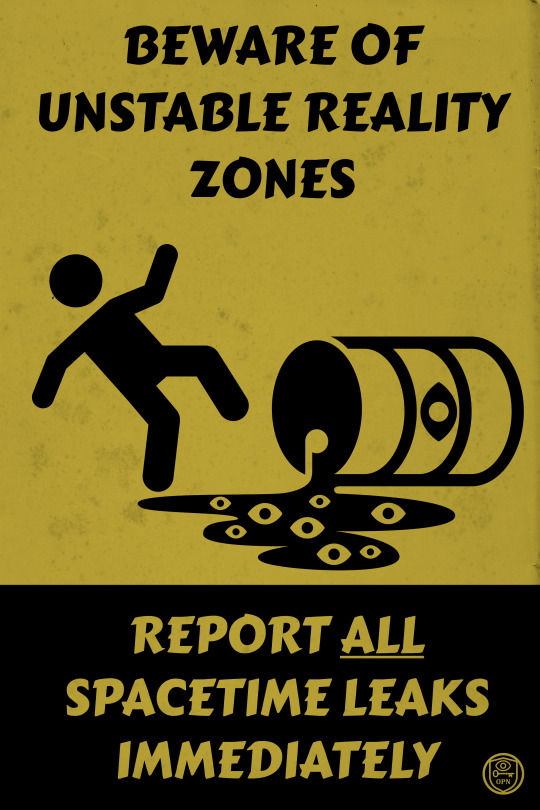



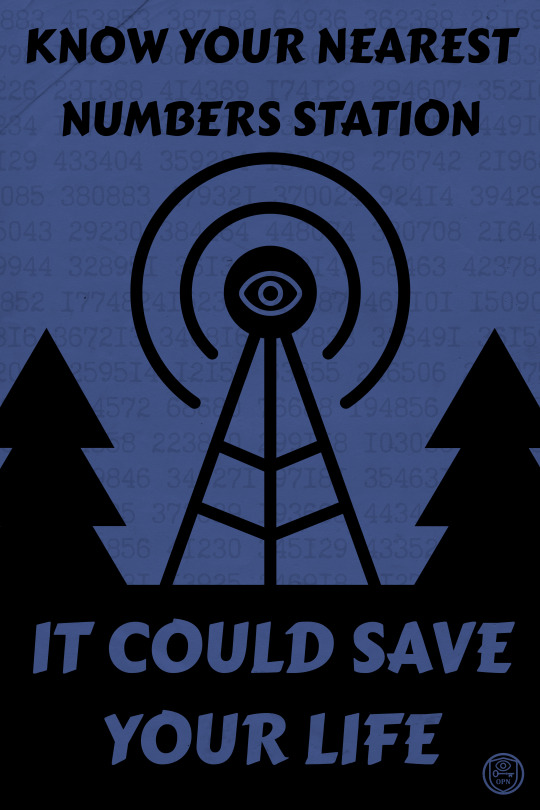
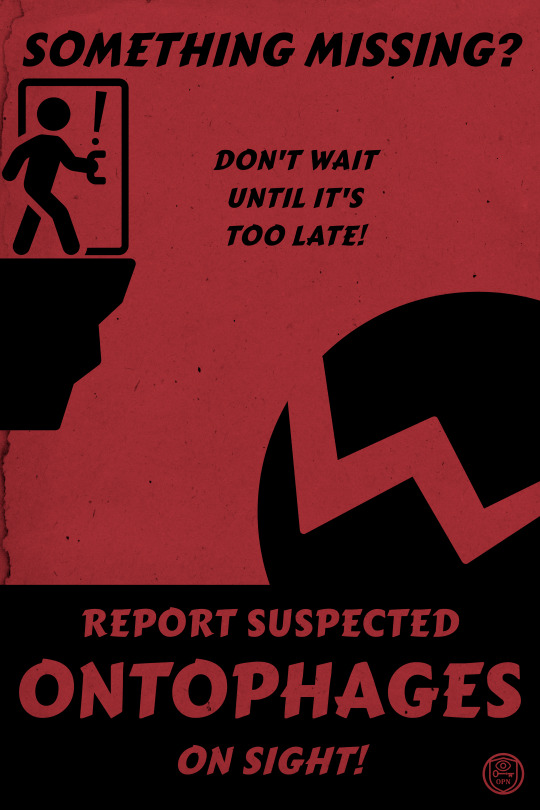

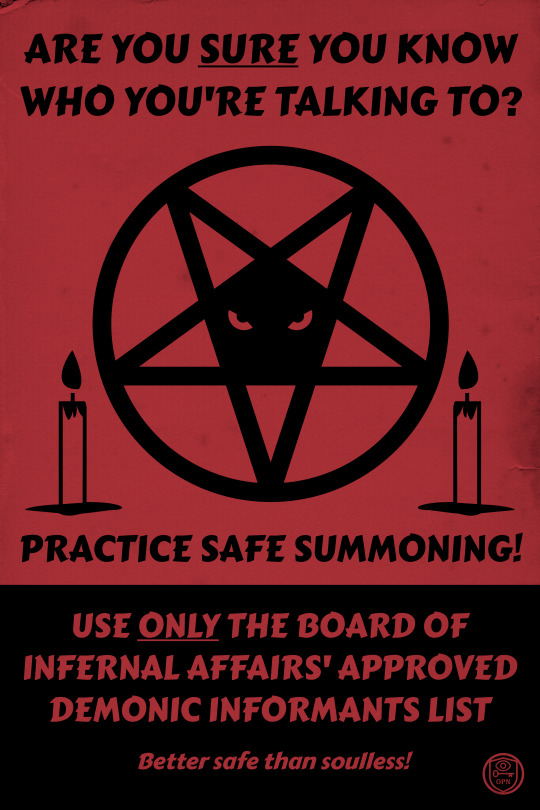
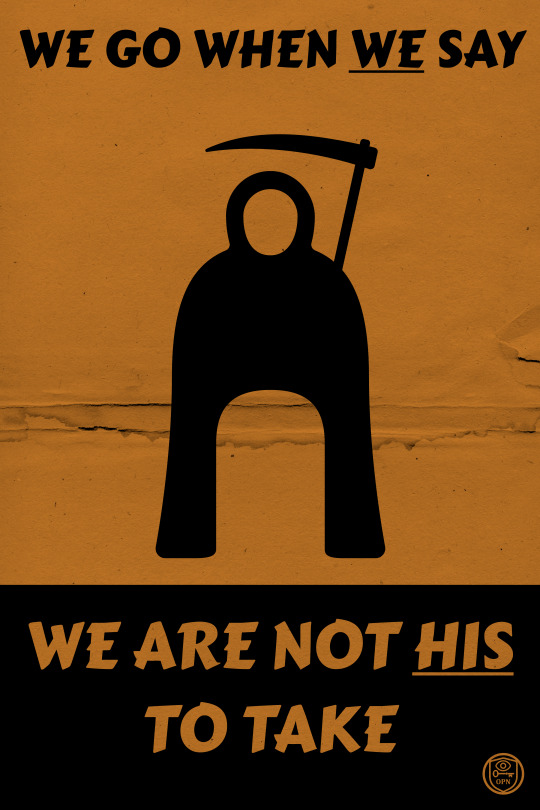
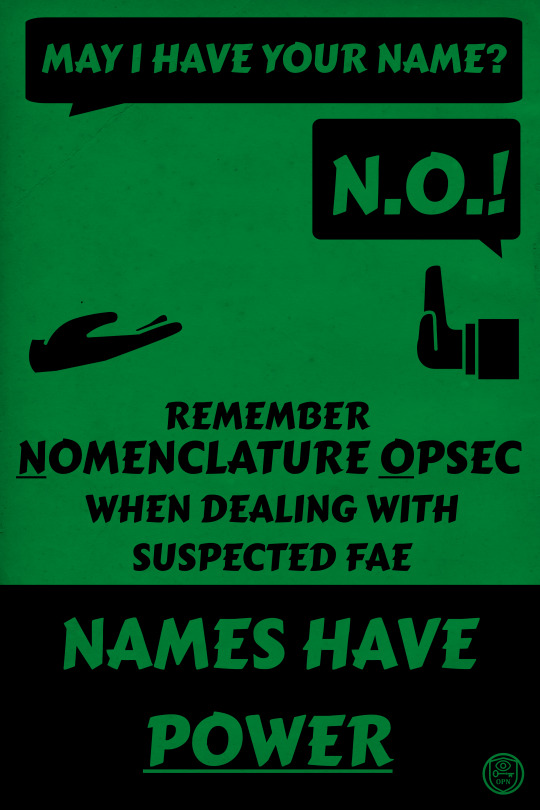
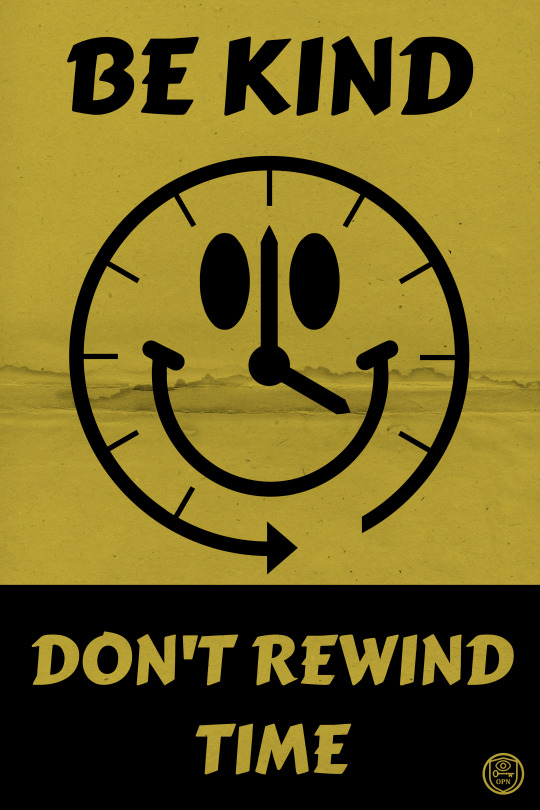


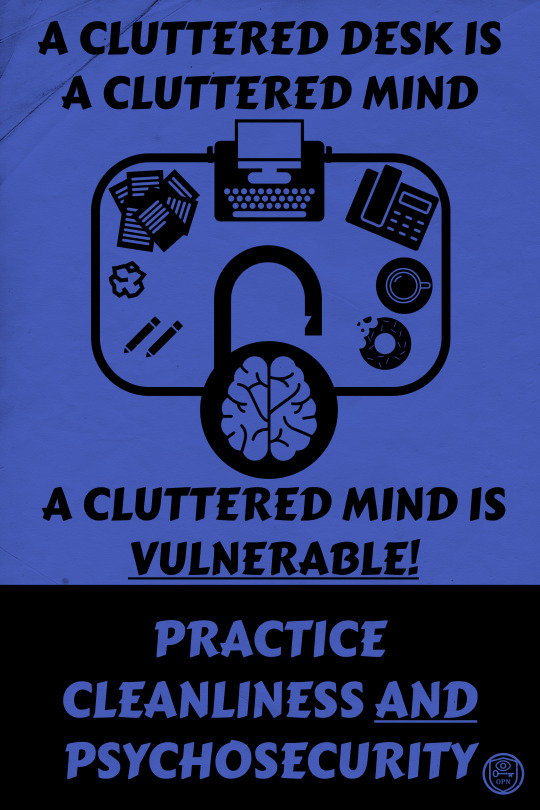
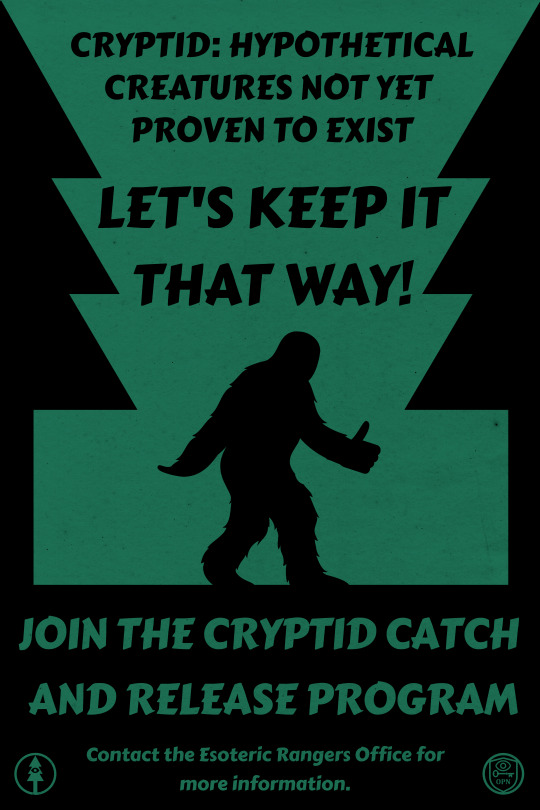
I feel confident enough to post these now. A collection of all the existing posters after some edits from the other post that got 13k notes! These are full size/quality. Go nuts.
You may use them for wallpapers, tabletop campaigns, whatever. Consider tipping me or buying a print or sticker on ko-fi here! If you do use them, let me know what for, or send pictures!
89K notes
·
View notes
Text
Are They Even Trying Anymore?
After the Key Bridge Disaster and the April 8th 2024 eclipse, I listened to several podcasts on conspiracy theories. A strange consistency emerged that I had also witnessed - it seemed people weren’t really trying to craft conspiracy theories.
Oh there was the usual stuff. The rapture and chemtrails, cyberattacks and secret plots. But it was all things we’d heard before. Some of it, especially the eclipse conspiracy theories seemed laughable like some extremely predictable astronomical event was a magical/occult/divine arrangement that was important for some reason. It was lukewarm and recycled.
There was bigotry and biases, of course, especially in the Key Bridge Disaster. Plenty of racist crap was spewed online about various people and the city of Baltimore. It was no different than any of the racism and bigotry the day before, just shifted around a bit. It was racists being racists because of racism.
Finally, there was a lack of coherence to the conspiracy theories. There wasn’t any grand overarching plan or narrative - even “God” apparently didn’t have one. There was no chart with red string, no colorful complex graphic explaining it all circulating online. It was so low effort.
A lot of what I saw, and what the podcasts I followed saw, seemed to be people essentially tossing out old ideas and biases and calling it a day - or mentioning disconnected points and saying, essentially, “suspicious?” Maybe both if you got some really ambitious person with an online handle like “EagleFlightPatriotAlpha1776” and AN AI avatar with ten-pack abs and thirteen total fingers.
But man, the usual suspects and newcomers to stringing together bullshit weren’t trying. Maybe they were tired, maybe it was just the confluence of events and non-events, but I mean I had expectations. However I wonder.
Is conspiracy theory culture tapped out in America? I mean we’ve done it all, from space super-soldiers fighting reptoids (which are just anti-semetic tropes) to gigantic financial and political conspiracies (which are just anti-semetic tropes). Maybe people are out of ideas, maybe we’ve hit a kind of saturation.
Perhaps people are ALL trying to do the old trick of spewing random things and seeing what audiences want. Maybe everyone wants to get hits by low effort, give in to audience capture, and do whatever. Maybe we’re hitting even more widespread, but lazy grift.
Could it be that current news (Trump, Israel, and Ukraine as of this writing) has sucked all the oxygen out of the room? Has reality occupied too much time of people’s minds?
Were these events just too reality-based to get a good theory going?
Or maybe we’re all just worn out from continuous crap and it’s even hit people who are Too Online.
I mean I’d be glad if Conspiracy Culture is somehow worn out, winding down, and maybe falling apart. Maybe we can get some reality in there But I suppose I have to know what’s going on, just in case.
Which I guess makes me a bit like a Conspiracy Theorist.
- Xenofact
1 note
·
View note
Text
The Imaginary Children Bring Terror
Previously I had written how Imaginary Children were important to many a conspiracy theorist. By claiming to save children that didn’t exist - from the not-born, to the not-real, to the in-the-imagined future - people justified all sorts of grifts, conspiracy theories, and so on. “For the children” is both a triggering set of words and a meme because of how common it is.
These phantom children also justify all sorts of extreme responses.
To say one is going to “save the children” is an excuse to pretty much do anything you want - after all, doesn’t everyone want to do that? There’s no amount of money (belonging to other people) that you can spend, no amount of surveillance you can’t do, no amount of arrests you can’t make. “The children” are the ultimate excuse.
And of course for authoritarians, the perfect excuse.
To say one is going to “save the children” also means anyone you accuse of harming them is also undeniably evil. Who would ever want to hurt (the made-up) children but someone irredemably evil? You can do anything to anyone you want if you accuse them of hurting children first, even imaginary ones.
Again, perfect for authoritarians and bigots, but perhaps I repeat myself.
However, even if people are not harming the illusionary children, people who are in the way are still a barrier. If they question you or don’t want to go on a crusade, they’re at best someone to ignore if not outright enemies. Plus you can convert anyone questioning your love of false children into a villain when you need to.
An endless supply of enemies to send minions after.
In fact, to say you’re doing things “for the children” - especially future children - let’s you justify ignoring or creating problems. Ignore climate change, we have children to save. Creating a police state mine just be fine if you’re saving the children. Not paying your workers a living wage is important because your great wealth will be used for the future children - honestly.
If it’s for the children, you can do anything. Also you might just by coincidence become rich and powerful. Imaginary children are perfect tools for grifters, con-artists, and authoritarians.
Again, what’s weird to me, what is hard to understand, is how people can so easily ignore real children. Maybe it’s because real children aren’t perfect, aren’t the right color, and take effort to take care of. Maybe dealing with real children requires one confront the horrible reasons they suffer. Either way, plenty of folks seem to prefer imaginary kids to real ones - probably because they’re an excuse.
It’s up to us to focus on real people, kids or otherwise, because those focused on imaginary children will use them as an excuse to be terrible. It’s important to focus on real people because the people worried about imaginary children will use them as an excuse to be terrible to them.
- Xenofact
1 note
·
View note
Text
Ask Doctor Hal is in Two Weeks!
Ask Doctor Hal is in TWO WEEKS. You have two weeks to prepare! To come up with questions! To send money!

0 notes
Text
It's Imaginary Children All The Way Down
Imaginary Children play a huge role in America's "extractive politics." By extractive politics I mean those that use people and their resources as fuel, usually returning nothing, and often causing them great damage. One way to get people to go against their own interests is to invoke imaginary children.
We've seen this with evangelizing charities promising to help children in other countries - of course middlemen took their cut, evangelized, and ignored the real causes of suffering in the world. But everyone got to pat themselves on the back while surprisingly little got done. You might see pictures of real children in need, but there was always an abstraction in the pitches and grifting that made them less than real.
Then there's abortion in America, which historically was just a way to get votes without resorting to old racism routines. People are wound up by politicians and preachers to absolutely get distraught over imaginary children while ignoring the plight of very real human beings. You never see someone say "I worry about the children so I am against abortion and for universal health care" or something. So people vote anti-choice and then suddenly find they can't get IFV, medical treatments, and so on and everything is worse. No real children or people are helped, but those maybe-babies are somehow safe.
(Of course, you'll notice racist crap keeps coming into the anti-choice side when they argue things like we need more babies so we're not replaced with some kind of non-white people. Anti-Abortion politics always had racial fear in it.)
Further along the grift-on-imaginary is the Satanic Panic crap over the centuries that morphed into the entire QAnon/Save the Children insanity of the 2010s-2020s. Evil forces were doing awful things to children in rituals, draining their blood to make drugs, and other things fevered grifters and sanity-challenged posters could come up with. Just like other Satanic Panics there was no evidence, because it was all just a mix of grift and attempts to call political opponents child-victimizing pervert Satanists. It was all about imaginary children, and it led to real-world consequences from conspiracy theorists.
Oh, and of course, those propagating these conspiracy of child-consuming cabals somehow ignored real children, real suffering, and questionable sexual behavior among their heroes. Because of course they did.
By the time you get to imaginary evil cults victimizing imaginary children it imaginary scenarios it feels like you've hit peak made-up-child-for-grift. Where can you go when you resurrect anti-Semetic tropes, witch-hunts, bonkers consiracy theories, and pathological politics and voltron them together? It feels like there's no where else to go in the field of finding ways not to give a shit about real kids.
Wrong, you can go into the future and take the Imaginary Kids to the final fronteir.
We see this in weird futurists, startup grifters, and long-termist pseudo-philosophers. They have to think about the kids of the future! Those Future Kids are just as important as kids these days if not more so! Also this justifies them getting rich doing cryptocurrency startups for nutritional supplements and not paying their taxes. Someday all that money they have will be used to make a better future, and not just wasted in a midlife crisis after their fifth divorce and an FTC investigation.
The Imaginary Kids have gone cosmic, and assholes can justify being part of an exploitative economy and abusing people because they might help Future Kids. It's not a grift or daddy issues, really!
Conspiracy bullshit, religious fanaticism, and futurist greed-excusing are all the same. They rely on Imaginary Kids to get you to buy their crap and excuse their abuse.
Its up to us to focus on real people, not empower these assholes, and shove their face into the suffering they excuse and cause.
Xenofact
0 notes
Text
The Changes: People
As I study the I Ching, cultivating a kind of mental “Ecosystem” of thought, I’ve found various changes in my mindset as hoped. Last column I mentioned that the I Ching, the Book of Changes, helped me think of situations (portrayed as Hexagrams) as “Changes” - situations that arise and transform and depart. This viewpoint has been informative, useful, and reduced stress since I feel both more empowered and less prone to worry.
But there are more insights I wanted to share, namely that I realized that it’s useful to think of situations, portrayed by Hexagrams, as “Changes,” but so are people. People are Changes.
People are constantly shifting and changing - that’s kind of what we do. Who we are right now is the result of various circumstances, we steer ourselves towards certain goals, and change to someone else. A human is indeed a Change, a constant shifting dialogue with both ourselves and the universe.
When I had this insight, I suddenly saw how I viewed people as static and how wrong that was. A person can be different between morning and night, hour to hour, or minute to minute. Yes we may have reasonably solid traits, but those will change and evolve, and even their expression may alter when they’re solid.
This made me see other people much differently. I saw how my idea of a person as static meant I was judging them inappropriately and missing how they may grow and develop or just have a bad day. It also reminded me that interacting with people is navigation, just as one navigates the Changes of the I Ching.
For some reason, seeing people as “more changeable” helped me appreciate them more as people.
But if other people are Changes, then so am I. I am not solid, I am more a flow like water, shifting and moving, now deep now shallow, changing direction. I am different day to day and moment to moment. That also means that, seeing I am a Change, I can choose how I evolve and grow and respond. I’m not a solid thing, I am far freeer than that.
I even saw this in my Secret of the Golden Flower style meditation, where I just follow a slow even breath. Every moment of breathing and following is a moment that leads into the other, a constant changing stream. If I get some distraction I merely flow back, realizing that I am, as noted, a dialogue.
We’re all changes, we’re all not solid. It’s rather relaxing.
This work at building a mental “Ecosystem” using Taoist thought has helped me lead a richer, deeper, more connected life. I’m curious to what insights I might have next - we’ll see what arises.
-Xenofact
0 notes
Text
The Changes: Situations
As noted in previous writings, I’ve been working to cultivate an “Ecosystem” of thought, based around my Taoist influences. This includes reading bits of the Tao Te Ching each day, as well as studying at least one Hexagram from various translations of the I Ching. I’d like to focus on the latter, as it highlights the benefits of this “ecosystem” approach.
The I Ching’s name roughly translates as Book of Changes, which fits its origins and many, many modifications. It seems to have started as a divinatory guide, but includes philosophical commentary that has been added to over the years, and of course there are many “less official” takes. But at it’s core are 64 situations in life that one may be in, and advice (supernatural or otherwise) applied to it. And over the aeons, people have had plenty to say.
I suppose a book called “The Book of Changes” that . . . changes . . . kind of fits. I rather enjoy the additional commentary that others have added because it’s all about understanding situations in life and how to respond. In my readings something struck me about how this is all about the “Changes” in life - every situation is a change.
Whatever situation we’re in, it’s the result of a change, and in turn it will change into something else. It arose from something before it, and will pass into something after it. The advice in the I Ching and many a philosophical work is really “how do you deal with this and determine what will happen next.” I realized from this that whatever situation I might find myself in, it’s healthier to think of it as “A Change.”
Because I think of whatever arises as A Change, I don’t act like it’s permanent because it’s not. If it is good, it will pass or decay, or need maintenance, or need to be altered to continue. If it is bad it will pass, and it is up to me to navigate the time and how other things may result from it. The moment is a squirming, living, changing thing.
This helps me be less worried about the moment as it’s about steering towards something - or at least surviving the current Change. I’m living a snapshot of life, part of something greater, and I can see it as a chance to take control (or take my hands off the controls). I don’t see it as solid, I see where I am as mutable.
Viewing the current moment of life as a Change also helps me be responsible, and asks how do I deal with it and what may come next. Indeed the I Ching is often about “here’s this situation, here’s some advice of what may be an annoyingly general quality.” But it is about “how do I respond,” and it sort of helps that over the centuries quite a few people responded with “here’s my opinion.”
So this use of the I Ching, to switch my view to seeing life as Changes, has been quite helpful to me. It’s more responsible, less stressful, and honestly more engaging with life. I suppose I passed some point in my “mental ecosystem” where I’m seeing the world as far more of an ecosystem.
Also It’s more relaxing, and I appreciate that benefit as well.
The Changes: Situations
As noted in previous writings, I’ve been working to cultivate an “Ecosystem” of thought, based around my Taoist influences. This includes reading bits of the Tao Te Ching each day, as well as studying at least one Hexagram from various translations of the I Ching. I’d like to focus on the latter, as it highlights the benefits of this “ecosystem” approach.
The I Ching’s name roughly translates as Book of Changes, which fits its origins and many, many modifications. It seems to have started as a divinatory guide, but includes philosophical commentary that has been added to over the years, and of course there are many “less official” takes. But at it’s core are 64 situations in life that one may be in, and advice (supernatural or otherwise) applied to it. And over the aeons, people have had plenty to say.
I suppose a book called “The Book of Changes” that . . . changes . . . kind of fits. I rather enjoy the additional commentary that others have added because it’s all about understanding situations in life and how to respond. In my readings something struck me about how this is all about the “Changes” in life - every situation is a change.
Whatever situation we’re in, it’s the result of a change, and in turn it will change into something else. It arose from something before it, and will pass into something after it. The advice in the I Ching and many a philosophical work is really “how do you deal with this and determine what will happen next.” I realized from this that whatever situation I might find myself in, it’s healthier to think of it as “A Change.”
Because I think of whatever arises as A Change, I don’t act like it’s permanent because it’s not. If it is good, it will pass or decay, or need maintenance, or need to be altered to continue. If it is bad it will pass, and it is up to me to navigate the time and how other things may result from it. The moment is a squirming, living, changing thing.
This helps me be less worried about the moment as it’s about steering towards something - or at least surviving the current Change. I’m living a snapshot of life, part of something greater, and I can see it as a chance to take control (or take my hands off the controls). I don’t see it as solid, I see where I am as mutable.
Viewing the current moment of life as a Change also helps me be responsible, and asks how do I deal with it and what may come next. Indeed the I Ching is often about “here’s this situation, here’s some advice of what may be an annoyingly general quality.” But it is about “how do I respond,” and it sort of helps that over the centuries quite a few people responded with “here’s my opinion.”
So this use of the I Ching, to switch my view to seeing life as Changes, has been quite helpful to me. It’s more responsible, less stressful, and honestly more engaging with life. I suppose I passed some point in my “mental ecosystem” where I’m seeing the world as far more of an ecosystem.
Also, It’s more relaxing, and I appreciate that benefit as well.
-Xenofact
0 notes
Text
"I've received mail under that name, and if the USPS can find me, I believe the spell can find me."
-some new taglock knowledge I just dropped [made up]
392 notes
·
View notes
Text
Spirit work expectation: Seeing spirits 24/7, contacting big entities to make contracts, summoning demons to help curse your enemies
Spirit work reality: Forgetting to talk to the spirits for a week straight and offering half an Oreo as an apology
1K notes
·
View notes
Text
Vault of Slack Issue #2!
It is here! The Vault of Slack Issue 2! Thrill to the tales of Elder Badass SPLR! Analyze Slack with Drunkulus! Explore Bulldada with yours truly! Feast your eyes on the eye-melting art of Forest Gummo!
AND SO MUCH MORE!
0 notes
Text
They Have A Fetish
I’m rather genteel here, but I don’t feel like being genteel about the issue of idiots banning abortion. Abortion is necessary to let people who get pregnant to control their bodies. As far as I’m concerned a lot of the people who want to ban it or limit it extremely are acting out a sexual fetish by creating and enforcing these laws.
Harsh? Cruel? Well if you read this we probably think alike, so you may agree, but look, I’m on a roll here.
So first of all, let’s note that most of the “for the children” claims come from people who don’t give a damn about actual kids. There’s no concern about immigrant children (quite the opposite). No one’s talking about expanding medical care or heavens forbid universal health care. Schooling is treated as just a chance for indoctrination by the forced-birth crowd. Also if kids are LGBTQIA+ then, well, this crew of womb-controllers seem to be happy to let them die.
Since all the reasons for banning abortion as “protecting kids” are obviously not what the control-freaks say, we can focus on the anti-choice crowd’s obsession with controlling people’s bodies. Yes, it’s an obsession, because it’s everywhere in the usual right-wing control-o-sphere. If you’re familiar at all with these right-wing mindspaces, the overwhelming, constant anti-choice repetition is unmistakable. It is embraced, it is, in short, a fetish.
Now the anti-choice swarm ignores people’s right to control their bodies, ignores their choice of medical treatment, and ignores abortion is a lifesaver in many ways. The need of the pregnant people is tuned out. Again, the utter obsession is beyond anything, into the realm of sexual obsession - of a fetish.
Sounds harsh? Not really. You’ll also notice as much as womb-controllers say they’re “for the kids” they are also obsessed with suffering. Most of the anti-choice people also seem to want to “save the children” from assorted imagined Satanists, evil cabals, etc. They’ll talk endlessly about human suffering, and it’s clear they take pleasure recounting how kids are tortured in their imagination. Again, these people have a weird sexual fetish about control and suffering.
And they go on, and on, and on . . .
But all of these people who want to tell people who can get pregnant what to do with their bodies want to do it with force. With the law, with the police, with threats, and in a few too many cases when you really listen with execution. There’s a sick, bloody, need for control and to punish.
So, yes, the anti-choice crowd as far as I’m concerned are sexual fetishists who want to nonconsensually draw others into their obsession. They’re ready to use the state to act out their twisted desires.
Sure, there’s also issues of control and politics, but this stuff goes all the way into weird, sexual fetishism. These people are obsessed, unhealthily so, and to the detriment of everyone.
And, yeah, this isn’t my usual deep discussion. Or maybe it is in a more angry way. But having a bunch of people who can’t confront their own fetishes and who want the police and government to rope us into them? We should be angry.
- Xenofact
0 notes